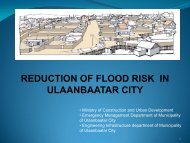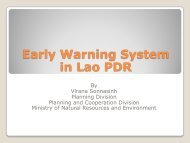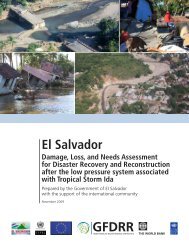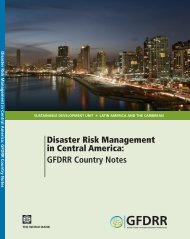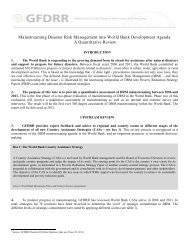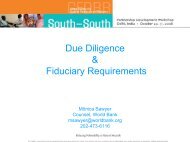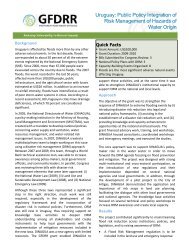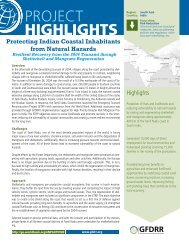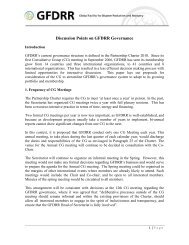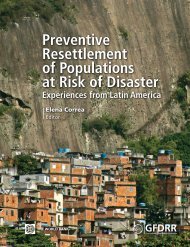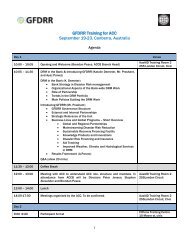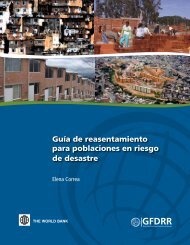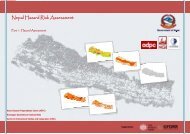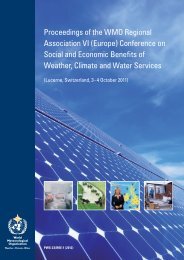Rapid Assessment for Resilient Recovery and ... - GFDRR
Rapid Assessment for Resilient Recovery and ... - GFDRR
Rapid Assessment for Resilient Recovery and ... - GFDRR
Create successful ePaper yourself
Turn your PDF publications into a flip-book with our unique Google optimized e-Paper software.
Government partnership with CODI: The Community Organizations Development<br />
Institute (CODI) has a decade of experience in facilitating low-income communities to<br />
rebuild their environment. A semi-government institution, CODI receives core budgetary<br />
support from the government. CODI <strong>and</strong> their partners can be mobilized 1) to help<br />
communities assess <strong>and</strong> articulate their housing <strong>and</strong> settlements needs, determine priorities in<br />
costing <strong>and</strong> targeting, <strong>and</strong> assist communities in managing rehabilitation <strong>and</strong> reconstruction of<br />
their neighborhood; <strong>and</strong> 2) to assist communities in assessing the causes of damage <strong>and</strong><br />
find solutions <strong>for</strong> them, among others by revisiting indigenous coping mechanisms in<br />
housing <strong>and</strong> environmental design, <strong>and</strong> where appropriate, including options of<br />
resettlement. The processes may build on the Baan Mankong modality of delivery of<br />
actions on the ground. 109<br />
As has been shown by the Baan Mankong program, communities are capable of managing<br />
the rebuilding of their own housing at a relatively large scale, if given the chance <strong>and</strong><br />
responsibility, <strong>and</strong> adequate assistance. Cooperatives have been a strong element in the<br />
processes, <strong>and</strong> can provide economic resilience to communities (<strong>for</strong> instance coping with<br />
arrears) while managing community projects. It also showed that actively involving women<br />
from the start in decision making <strong>and</strong> planning provides a much higher level of transparency<br />
<strong>and</strong> accountability of the activities, <strong>and</strong> strong relevance to actual family needs.<br />
No high-pressure timeframe: People do not need to be in a hurry to repair their home,<br />
except <strong>for</strong> repairs on doors <strong>and</strong> windows, <strong>and</strong> painting. Unlike in post-tsunami or postearthquake<br />
situations, over half of the affected families could stay in their inundated<br />
houses, while the other half evacuated but could return to their homes as soon as the<br />
house was cleaned <strong>and</strong> dry. Of the estimated 1.96 million affected families, “only” 1 percent<br />
(19,000 families) is estimated to have been <strong>for</strong>ced to live elsewhere because of total<br />
damage of their house. On the other h<strong>and</strong>, care needs to be taken if grants are h<strong>and</strong>ed<br />
out to beneficiaries in a region at once, which will trigger high levels of activity <strong>and</strong> dem<strong>and</strong><br />
intensity of assistance by facilitators <strong>and</strong> close guidance by government agencies in the<br />
use of the grants. For this reason, community preparedness (in terms of organization <strong>and</strong><br />
action plans) will become the prerequisite <strong>for</strong> launching every activity.<br />
Facilitation<br />
CODI itself has relied on community activists to do all the deliberation <strong>and</strong> organization,<br />
<strong>and</strong> has been able to develop community networks that are actively interacting with a small<br />
number of personnel in the field covering a large region. This is an ideal setup that keeps<br />
initiative in the h<strong>and</strong>s of people. However in post-flooding reconstruction, some input may<br />
need to be provided simultaneously to the process, which means a higher need <strong>for</strong> personnel<br />
capable of dealing with communities <strong>and</strong> conveying the right messages. Aside of<br />
training of key community organizers, local <strong>for</strong>ums (including all parties) may need to be<br />
109 The Baan Mankong program has provided improvement of 80,000 houses in slum areas between 2003 <strong>and</strong> 2009,<br />
or serving 13,300 families per year; this was done with government funds. The <strong>Rapid</strong> <strong>Assessment</strong> team considers this<br />
approach very suitable <strong>for</strong> post-disaster reconstruction, as proven effective in various community-driven post disaster<br />
reconstruction programs in other countries, among others the reconstruction of over 250,000 houses by community groups<br />
in post-earthquake Yogyakarta & Central Java in less than 2 years.<br />
THAI FLOOD 2011 RAPID ASSESSMENT FOR RESILIENT RECOVERY AND RECONSTRUCTION PLANNING<br />
157



